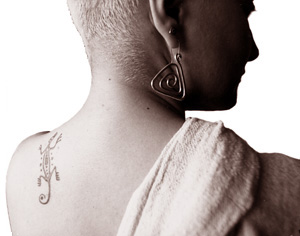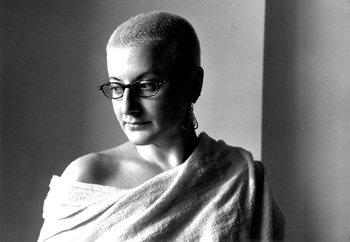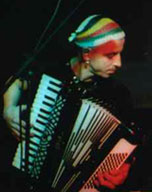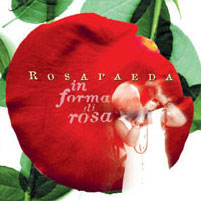Rosa Paeda

Nondas Kitsos talks with Rosa Paeda about life, music, immigration, language and the ensemble Rosapaeda.
After listening to Rosapaeda's recent recording In Forma di Rosa, I was left with more questions than answers. Rosa Paeda seemed the kind of person you should sit down with for a long discussion, preferably over frozen cappuccinos and home-cooked pasta with basil sauce.
"Piccola follia" |
Of course, I also wanted to see Bari again, that semi-magical Timbuktu of a place that had such a big effect on her, right?
"To tell you the truth, I don't feel particularly connected to Bari, or better still, I do not recognize myself as one of its inhabitants. But maybe this depends on the fact I do not feel a strong sense of belonging, in a geographical sense, as I prefer to feel a part of the world�" I thought she would never want to leave, that she loved living there. "For the time being, I live here, but I feel ready for a change� I feel a certain nomad part in me� even though, far from here I find I get a bit nostalgic about it�"
There goes my delusion that place makes the person. Fortunately, what she loves the most is "that part of the land, the sea, the olive trees, the local cuisine, certain smells that you feel on a Sunday morning in the Old Town�" I guess this is what is known as the 'spirit of the place,' that eloquent feeling that creates an association between a locale and its inhabitants or visitors.
Reader, it didn't happen. I was forced, instead, to use the magic of the new digital communications to reach her via e-mail, over a period of some months, while she was already on not one but a couple of demanding tours! In a way, that is probably better as it allowed this discussion to follow our lifecycle, instead of the other way, where ideas are forced to develop within the restraints of a given time and space.
if it doesn't stir emotions in the listener."

"Music is indeed an absolute language, universal, capable of stirring emotions and making imagination fly without barriers. It is a direct language, talks to everyone and it either works in stirring your emotions or doesn't! It happens or it does not�" Rosa is a real lover of not only music as sound, but of the very act of singing: "The profoundness of being� The breath, the most ethereal and profound part of us that becomes pure sound and emotion" and I could almost imagine that little girl singing her heart out, sweeping the house! She was positive about the idea that even today, a young girl just like her could find the way to singing, as "the sentiments, the emotions are the force that attract everything, they are things that do not change, well, maybe their form changes, but not their substance� Even though I am afraid that kids today live a more or less altered reality, I must accept, with great pleasure, that the desire to learn and grow up persists! I hope with my singing, to light up little sparks in whoever is listening, because I believe this to be my real function."
"Bari mediterranea" |
 Without physical access to her record collection, she had to introduce me to what turned out to be the usual (and a few unusual!) influential musical suspects: Fabrizio de André and Francesco Guccini from Italy, Patti Smith, the Clash "and, obviously, the very great Bob Marley," reggae being the fuel that moves Rosapaeda. It was "love at first listen" when she came across the music by accident during 1978 and 1979, when reggae first appeared in Italy and she and some friends started buying the first LPs. The social scene in which reggae flourished in Bari had more than passing resemblance to the situation in Greece in the same period: "In the beginning, we were considered to be nuts� but we were close to the period of the British punk, the New Wave� even reggae itself started to infiltrate the radio waves and appear in the record shops. Of course we were pioneers! But our love for reggae made us establish a group in order to promote this music, with radio shows, nights in discotheques, etc. � little by little, reggae became something 'ascoltatissimo!' "
Without physical access to her record collection, she had to introduce me to what turned out to be the usual (and a few unusual!) influential musical suspects: Fabrizio de André and Francesco Guccini from Italy, Patti Smith, the Clash "and, obviously, the very great Bob Marley," reggae being the fuel that moves Rosapaeda. It was "love at first listen" when she came across the music by accident during 1978 and 1979, when reggae first appeared in Italy and she and some friends started buying the first LPs. The social scene in which reggae flourished in Bari had more than passing resemblance to the situation in Greece in the same period: "In the beginning, we were considered to be nuts� but we were close to the period of the British punk, the New Wave� even reggae itself started to infiltrate the radio waves and appear in the record shops. Of course we were pioneers! But our love for reggae made us establish a group in order to promote this music, with radio shows, nights in discotheques, etc. � little by little, reggae became something 'ascoltatissimo!' "
Different Stylee, her first proper band, was the hothouse in which Rosa grew. She flowered, however, during her solo career but her links to that band are not completely cut. Her current sound engineer was the one for the Different and this year she'll make a tour with a sound system and a live set, with the guitar player from the group playing the role of DJ.
As her later career seems quite different to her reggae years, I wondered if she had grown in a world where traditional music was all around, but it seems globalization was already making inroads. "In Italy, there had been a great influx of Anglo-Saxon and American music, while the musical tradition was considered to be something for the old people or the communists to listen to! It had survived in the places with a heightened sense of identity, and those where the rituals and the dances had continued to accentuate the rhythm of life� I, myself, became closer to traditional music as an adult, feeling the need to affirm my identity as a Mediterranean woman."
 Eddi Romano |
When we discussed recording, I was expecting the usual 'there is nothing like a live set' talk, but instead it seems that Rosa loves the studio experience. "It helps you to grow up as a person and it usually creates a sense of co-operation between the musicians� [for the] vocalist, it's a magical moment because you have to concentrate very much on the given technical situation as well as your interpretation� Listen to yourself� Create the proper environment for singing� In short, it's a meditative moment and one of study." Again, I can visualize her loving not only singing, but also the act of singing: the preparation, the breathing, and the power of music to surround you and take control of you. As for choosing her material, she doesn't seem to have a particular method for that, except that she always has faith in her gut feeling� "If a melody stirs emotions in me, I make a mental note of it, I work on it� For the rest, it's not difficult to locate traditional music albums� for the time being! So, I listen� and if what I listen to takes me over, it's done! But I'm really not interested in proposing again pieces as cover versions. Both Eddi and me like to mess with things, elaborate on them, interpret them�"
As for the future, it seems she is still harvesting the fruits of her new CD, "that has been going around the world, mirroring me� We already have concerts in the works in Italy and in Europe to promote it. Together with Eddi we also tour a recital for voice, piano, fisarmonica (accordion) and drums, of love songs from various places. Music to listen to. And in the same wavelength as our collaboration with Mr. Rootsman, a show [comprised of] a sound system and voice on a remixed reggae base, on which I sing traditional pieces. A sort of fusion between modern rhythms and tradition. Both of these shows have a great impact on my time and involve me a great deal!"
"Ta travudia (The Rootsman remix)" |
 Her record seems to signify a meeting of the local and the global, the traditional and the modern, that is innovative and fascinating, opening up issues like the disappearance of the unique characteristics of the local cultures. It does not present much of a problem for her. "What frightens me about the future is the imbalance between various parts of the world� It's the feeling that the powers always get more arrogant and determined. This is something that also makes me very angry! But at times, I also feel so powerless!" On the question of whether it is sometimes easier to interact with people from abroad than those from your own country, it seems that she really cannot distinguish between people in such a way. "It's easy to meet others if you are open and this will surpass the cultural and linguistic divides."
Her record seems to signify a meeting of the local and the global, the traditional and the modern, that is innovative and fascinating, opening up issues like the disappearance of the unique characteristics of the local cultures. It does not present much of a problem for her. "What frightens me about the future is the imbalance between various parts of the world� It's the feeling that the powers always get more arrogant and determined. This is something that also makes me very angry! But at times, I also feel so powerless!" On the question of whether it is sometimes easier to interact with people from abroad than those from your own country, it seems that she really cannot distinguish between people in such a way. "It's easy to meet others if you are open and this will surpass the cultural and linguistic divides."
On the relationship between tradition and progress she says these are "two aspects of the natural tendency of humans to evolve, confront, project into the future� without the sense of their own roots there will be no progress, you need to have roots and curiosity� this is what makes human beings unique!"
In the midst of a period where the voices that consider the number and cultural provenance of the immigrant population in Europe all wrong, Rosa Paeda says, "Bari is full of immigrants that often find themselves living the life of the people of Bari. Obviously, the life of the illegal immigrants is very harsh, the way women are taken advantage of, the pressure from those who run the illegal immigration rings." Despite the gravity of this social problem, the solution seems to be getting further away all the time in the current political climate.
 Within that context, I brought up an issue that has been important to me lately, concerning the interaction between the recently arrived immigrants in places with distinctive local traditions, either strong or threatened, and how those immigrants might integrate themselves into that environment. "There is a lot of interest in the musical culture of the immigrants among the youth. Their music has renewed our own� the Arab and Indian dances etc., multiply all the time. This is for a reason: this exchange is an enormous source of development!" I could feel the vibe of the new multicultural societies that are boiling just below the existing straightjacket of the nation-states that have defined Europe for the last two hundred years or so (including the last two World Wars).
Within that context, I brought up an issue that has been important to me lately, concerning the interaction between the recently arrived immigrants in places with distinctive local traditions, either strong or threatened, and how those immigrants might integrate themselves into that environment. "There is a lot of interest in the musical culture of the immigrants among the youth. Their music has renewed our own� the Arab and Indian dances etc., multiply all the time. This is for a reason: this exchange is an enormous source of development!" I could feel the vibe of the new multicultural societies that are boiling just below the existing straightjacket of the nation-states that have defined Europe for the last two hundred years or so (including the last two World Wars).
A point of contention, especially in the South, was the introduction (at the time of the declaration of the independent and unified Italian State in 1861) of a unified "Italian" language, closely linked to the dialect of Tuscany. This is due to the great difference between it and the dialects of the South and it is related in part to the general misunderstandings between the North and the South. For Rosa Paeda, "a national language always carries the power to suffocate the dialects� There are dialects, like the one from Napoli, that are used widely. Even the one from Bari is, as are all the various dialects from the Puglia region. The oral popular culture has its own way of persisting, the dialect is the inner voice of the people, a living language that doesn't stay put for 100 years, and it would be a shame if it was so! It mixes up with whatever influences it and that is why it's vital that the dialects shall never be equal. Anyway, the people always manage to express themselves better in their dialects than in Italian� and that helps in preserving them!"
Proposing to her the words "party," "happiness," and "integration," she combined them all. "Party, happiness and integration are interdependent states. A true party is made up by people who mix it up, communicate, transmit and integrate. Getting acquainted again with the feelings that are common to all the people� and accepting the right of every human being to be different and unique at the same time!"
Her music is like that; a party where people mix, interact and enjoy each other, where the whole sensual beauty of feeling human and feeling alive thrives, united and different.
This interview was conducted via e-mail in the spring of 2002. You can read the Italian transcript of their e-conversation.
More about Rosapaeda:
The RootsWorld review of In Forma Di Rosa
CDs available from cdRoots
All images and audio are © Rosa Paeda and Sottosuono Music. Used with their kind permission